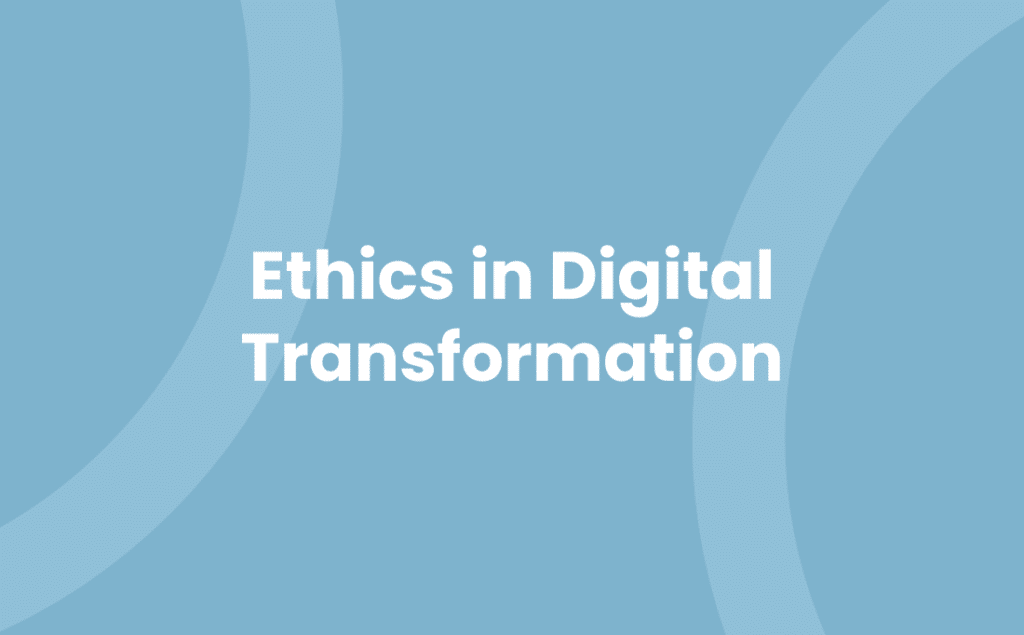In the digital age, transformation is no longer a luxury, but a necessity. But as you navigate this new terrain, have you considered the ethical implications? Digital transformation isn’t just about leveraging technology for growth‚ it’s also about understanding and addressing the ethical dilemmas that come along with it.
From data privacy to AI bias, the ethical landscape of digital transformation is complex and ever-evolving. It’s a journey that demands not just technological know-how, but also a deep commitment to doing what’s right. So, let’s delve into the ethical considerations of digital transformation and why they’re so crucial for your business’s future success.
Understanding Digital Transformation
Embarking on digital transformation signifies more than just adopting shiny new tech toys. It’s a journey embedding digital processes within the heart of your business to revamp operations and enhance customer interactions. Yet, amidst the operational enhancements and improved efficiencies, lies the intricate weave of digital ethics.
Picture digital transformation as a bustling cityscape. Skyscrapers of technological advancements dominate, yet intricate traffic of digital ethics continually criss-crosses through. Just as navigating city traffic demands attentiveness, manoeuvring through the complex, ever-evolving digital ethics, necessitates a similar vigilant approach. Exploring the intersections of digital ethics with transformation, helps exposing risks and assists in making informed decisions.
Digital ethics aren’t a mere footnote, rather a blueprint etched deep into every digital transformation project. Topical instances are data privacy and AI bias that call for active consideration. Aligning your transformation journey with ethical parameters avoids the pitfalls of unintentional biases or privacy breaches, prevalent in technological solutions. Privacy considerations dictate how data gets collected, stored and utilised, with violations incurring legislative consequences and reputational damage.
The ethical lens on AI revolves more around bias. AI systems learn from data. In other words, biases in data get reflected in AI’s judgement. An unbiased digital ecosystem becomes paramount, given AI’s widespread use in digital transformation.
Thus in comprehending digital transformation, understanding the integral role of digital ethics is vital. Sure, transformations help stride towards business growth, operational efficiencies, customer satisfaction and beyond. But it’s in addressing the interconnected matrix of ethics where you’ll find significant longevity of your digital investments.
In retrospect, the ethical considerations interplay intricately in shaping digital transformation decisions. They aren’t just foundational but are active roadmaps guiding every step of the transformation journey. Hence, acknowledging and embracing them in your digital efforts implies future-proofing your business success. That’s the crux of understanding digital transformation, an ethical gamble intertwined with technological progress.
Exploring Ethical Considerations
As you delve deeper into digital transformation ethics, a panorama of considerations demands keen attention. Respecting data privacy ranks among these topmost ethical considerations. While charting the digital transformation journey, every company must uphold the revered aspect of data confidentiality. Each piece of data collected holds immense personal value. Hence, as you transition digitally, protecting this data becomes an ethical obligation. Efficient and secure data governance measures bridge the gap between technology and privacy, thus strengthening trust with your stakeholders.
Another significant issue in the digital ethics arena is the potential bias in Artificial Intelligence (AI). Automation and AI play pivotal roles in digital transformation. Yet, they present a conundrum when AI algorithms reflect unintended biases, potentially echoing the prejudices of their creators. As you embrace these technologies, analysing AI models for any bias and periodically reviewing and refining them proves essential.
Moreover, the demand for transparency sits at the heart of digital transformation ethics. Here, transparency refers to lucidly showcasing the workings of digital solutions to your stakeholders. When you opt for AI-powered solutions, transparency also extends to explaining how algorithms make decisions. By clarifying how AI systems work, you can reassure stakeholders about ethical adherence, thereby fostering their increased trust and participation.
Additionally, understanding and addressing the digital divide underlines the ethical approach. As you progress in your digital transformation journey, it becomes pertinent to ensure inclusivity. Inaccessibility to digital technologies could widen social and economic disparities. Thus, striving for digital accessibility for all becomes an ethical duty.
Lastly, but certainly crucial, is the issue of e-waste management. Increased deployment of digital solutions inevitably leads to an increase in electronic waste. Ethically, it’s incumbent upon you to consider the environmental impact of your digital transformation initiatives and ensure e-waste is processed responsibly. By doing so, you can undertake a digital transformation that is not just technologically advanced but also eco-friendly.
In essence, as you traverse the path of digital transformation, being guided by the compass of digital ethics serves to create a more trustworthy, inclusive, sustainable, and successful digital presence. As such, exploring and embedding these ethical considerations enhances your business’s ascent towards a truly transformational journey in the digital realm.
Digital Transformation: Ethical Dilemmas
Delving into the realm of digital transformation, you’re bound to bump into several ethical dilemmas. These dilemmas often cloud the path towards successful digital transformation. The two most prominent ones are data privacy and AI bias.
Data privacy isn’t just about ensuring confidentiality. It’s also about respecting individual rights and adhering to regulations as you transition from traditional data handling to digital platforms. Your customers trust you with their sensitive information, and betraying that trust could result in severe backlash, fines, and irreparable reputational damage.
AI bias, on the other hand, adds another layer to these ethical challenges. It’s crucial to address these biases to prevent skewed and inaccurate decision making. For example, an AI solution incorrectly assesses a customer’s credit risk due to bias, leading to a denied loan application. This not only affects your business’s relationship with customers but also tarnishes your reputation.
Adding another ethical aspect, your digital transformation processes must remain transparent. AI-based decisions might often seem opaque to outside observers. Establishing transparency in your AI solutions and decision-making processes affords your customers greater assurance, building a healthier business-client relationship.
Furthermore, in your move towards digital, you’re ethically bound to ensure digital inclusivity. This means your digital presence accommodates all customers, regardless of their technological capabilities. For instance, a visually impaired customer should still be able to navigate your web platform with ease.
Lastly, managing e-waste becomes your responsibility in this journey. As you transition from traditional to digital tech, it’s easy to overlook the environmental harm caused by improper disposal of old technology.
These ethical considerations aren’t mere roadblocks. Instead, if navigated meticulously, their integration enhances trustworthiness, inclusiveness, and sustainability‚ all key factors ensuring your success in the digital world.
Digital Transformation: Ethical Solutions
Tackling ethical issues in your digital transformation journey demands clear understanding, real commitment, and action. Amid the digital realm, ethical principles get tested, and your business integrity hinges on addressing these challenges responsibly.
Prioritising data privacy is the kernel of demonstrating digital ethics. With digital transformation, huge volumes of data get collected daily, making it vital for businesses to affirm the confidentiality and privacy of all personal information collected. Digital ethics calls for enterprises to invest in robust data protection mechanisms. For instance, deploying advanced security software, implementing data encryption techniques, and conducting regular data audits are crucial.
Further, transparency in AI solutions emerges as a major ethical obligation. Artificial intelligence plays a potent role in your digital transformation journey. Yet, bias in AI systems can lead to unfair and discriminatory practices. Businesses, therefore, bear the responsibility to develop open and neutral AI solutions. Regular audits of your AI systems, diversifying your AI model development teams, and adopting bias-mitigation strategies can help earn stakeholder trust in your AI solutions.
Next, pushing digital inclusivity and accessibility forms another critical aspect of digital transformation ethics. Ensuring your digital platforms are accessible and user-friendly to a diverse range of users, regardless of their age, race, or abilities, mirrors an ethically sound digital transformation. Regularly soliciting user feedback, striving for universal design principles, and ensuring the comprehensibility of your online content can drive digital inclusivity.
Lastly, managing electronic waste shapes up as a green initiative in digital ethics. With digital transformation, electronic waste can mount to overwhelming proportions. A sustainable digital transformation would involve recycling and repurposing electronic devices, cutting down on e-waste, and running awareness programmes.
In short, ethical solutions involve placing people and principles at the heart of your digital transformation. By focusing on these ethical considerations, your business isn’t just taking an active role in shaping a responsible digital landscape, but also gaining the trust and loyalty of customers and stakeholders.
Empowering Digital Transformation with Ethical Strategies
Revamping business operations using digital ethics isn’t optional anymore. Businesses must incorporate ethical strategies, like prioritising data privacy and transparency, into their digital transformation. This stance is non-negotiable for maintaining trust and fostering inclusivity.
- Recognising Data Privacy: A cornerstone of any ethical strategies, respecting data privacy involves being transparent about how consumer data gets gathered and used. Companies, both big and small, process volumes of data every day, and the onus lies on these institutions to protect it, reinforcing trust in their digital operations.
- Ensuring Transparency in AI Solutions: Transparency in AI technologies is another challenge. Understanding how AI models make decisions can be elusive. Strive to reveal the inner workings of your AI systems for maximum transparency. It’s difficult, but achievable.
- Promoting Digital Inclusivity: An inclusive digital revolution ensures no segment of your user base feels alienated. Providing personalised, intuitive user interfaces, catering to a wide demographic, consolidates this concept.
- Managing Electronic Waste: The integration of technology in business operations leads to inevitable e-waste. A proper channel for e-waste management emphasises your responsibility as a digital entity.
Following these fundamental ethical strategies are integral to businesses during the digital transformation process. Breaching them might compromise brand trust and inclusivity, which could be detrimental to any future endeavours. By adhering to these strategies, you’re not only paving the way for an ethical work culture but are also setting the stage for a sustainable digital future.
Real-world Examples of Ethical Digital Transformation
Delving into actual instances of ethical digital transformative practice puts theoretical principles into a tangible context. Given the expansive application of digital ethics, it’s interesting to examine a few key instances where digital transformation ethics have been upheld.
1. Responsible Data Use – Microsoft
Microsoft stands as a paragon for a firm that prioritises its user’s data privacy. It’s adopted Privacy by Design principles, an ethical approach that integrates user data protection from the initial stages of product design. This stance limits the unnecessary collection of data, thus protecting customer privacy.
2. Addressing AI Bias – IBM
Artificial intelligence, a crucial tool in digital transformation, sometimes encounters issues of bias. IBM has conquered this challenge by creating an AI Ethics Board. This board evaluates AI tools against principles of fairness, ensuring they are not prejudiced and serve all users equitably.
3. Transparency in AI Solutions – OpenAI
OpenAI, an AI research lab, has built its reputation on creating accountable systems. It’s committed to providing public goods, for instance, by publishing most of its AI research. Transparency like this enables users to understand AI decision-making, fostering trust and engagement.
4. Digital Inclusivity – Barclays
Barclays, a leading UK bank, embodies the principle of digital inclusivity through its Digital Eagles initiative. By offering multiple online tutorials, Barclay’s Digital Eagles ensure that every customer, regardless of their digital literacy, can enjoy their services.
5. Responsibly Managing E-waste – Dell
Dell’s responsible e-waste management strategy paints a picture of ethical digital transformation. It’s committed to recycling e-waste in an environmentally friendly method, and also spearheading initiatives for repurposing broken electronic components.
Each of these real-world examples demonstrates how adopting digital transformation ethics doesn’t only drive societal good, but also successful business practices. By adhering to principles such as data privacy protection, fairness in AI, transparency, digital inclusivity, and responsible e-waste management, your business gets poised for a journey of ethical digital transformation.
Future of Digital Transformation: An Ethical Perspective
Peering into the future of digital transformation, ethical considerations stand as a towering beacon. A projection into this landscape demonstrates the role of digital ethics as a fundamental companion.
Prevailing digital ethics trends in future digital transformation
In the age of hyper-connectivity, certain ethical trends begin to separate themselves from the crowd:
- Strengthened Data Privacy: Data misuse has drawn global attention. Yeti, future transformations will push for robust data privacy measures (for example, data encryption, multifactor authentication).
- Abating AI Bias: AI is getting smarter. Attempts to eradicate artificial prejudices are gaining momentum (as seen with IBM’s Fairness 360 toolkit).
- Rising Transparency in AI: It’s not always clear about how AI makes decisions. A rising demand for clarity shines the spotlight on making AI decision-making transparent (as demonstrated by OpenAI’s gpt-3 model).
- Expanding Digital Inclusivity: Tech isn’t just for techies anymore. Companies will broaden their reach, ensuring everyone can interact with their technologies (as exhibited by Barclays’ digital eagles initiative).
- Sustainable e-Waste Management: E-waste has a damaging impact on the environment. Companies are getting greener in their approach towards e-waste, incorporating sustainable practices (as seen with Dell’s recycling program).
Challenges in maintaining digital ethics
While the movement towards a future driven by ethical considerations is promising, you’ll face several hurdles:
- Global Regulation Differences: Laws differ globally. Entities operating in multiple countries grapple with varying regulation requirements.
- Rapid Technological Advancements: Tech is moving at a lightning pace. Keeping ethical considerations aligned with swift transformations is challenging.
- Human Bias in AI programming: Humans create AI. An inherent human bias can inadvertently skew AI perspectives.
- Balancing Profit with Ethics: Revenue reigns supreme. Companies often grapple with aligning profitability and ethical practices.
Treading the path of ethical digital transformation does pose challenges. But, crucially, it boasts a future woven with an ethical thread, promising a landscape where technology benefits all without detrimental effects.
Conclusion
Navigating the ethical landscape of digital transformation isn’t a walk in the park. It’s a complex process, fraught with challenges such as global regulation variations, swift tech advancements, AI bias and the delicate balance of profit with ethics. Yet, it’s clear that integrating digital ethics is no longer optional. It’s a must for businesses that wish to thrive and contribute to societal good. Companies like Microsoft, IBM, OpenAI, Barclays, and Dell set the pace, demonstrating that ethical strategies can indeed drive success. Looking ahead, you can expect a stronger focus on data privacy, more transparency in AI decision-making, wider digital inclusivity, and sustainable e-waste management. Despite the obstacles, a future where digital transformation benefits all without causing harm is not just a dream. It’s a reality that’s within our reach if we commit to ethical practices.



